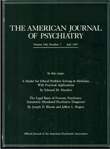Jane Addams went to medical school for less than a year and never thought of herself as a psychiatrist. Yet her actions and ideas have contributed to the development of social and community psychiatry throughout this century. This story begins in 1889, when 29-year-old Addams embarked on a lifetime of adventure (
1,
2). In that year she and a friend, Ellen Gates Starr, moved to an old mansion in the middle of the Chicago slums. Addams and Starr believed that democracy was not solely a matter of voting, but also a matter of interdependency and cooperation. In this idea, she followed in the footsteps of her father, a pioneer who helped settle Illinois and was a friend and supporter of Abraham Lincoln. Addams thought that people of money and influence had an obligation to work together with the poor in order to create a just and functional society.
The fact that “settlement houses” were really residences has been obscured with the passing of time and the shift in functions of those venerable institutions. But Addams and Starr, like others in England and around the United States, went to live among the poor in order to learn what was needed to improve their conditions. Hull House, as Addams's settlement came to be known, soon welcomed other residents, most often middle- or upper-class women concerned to be of service in an era that offered few opportunities to realize such an ambition. One of the first projects, which was a model for many later efforts, was a survey of the neighborhood residents, designed to learn about their backgrounds, occupations, living conditions, and health problems. The survey—in its conception and methods a forerunner of modern sociology—helped the settlement house team understand their new neighborhood, an area in which a remarkably diverse group of poor people were packed together in overcrowded, unsanitary living conditions.
Hull House began to tackle these problems in ways great and small. The residents believed fervently in solutions as diverse as the uplifting value for art and the need for clean streets. Perhaps because of the breadth of their vision, Hull House became a dynamic and powerful institution. Within 3 years of its founding, it had outgrown the original homestead. Addams and her co-workers began to add buildings that would eventually ring a city block. Every week 5,000 of the neighborhood's 50,000 residents came to Hull House for activities, classes, and social events. Hull House became a leading intellectual center in the United States, providing a window into the problems of the era and a laboratory for testing solutions. Addams and her co-workers developed a complex mix of support, education, and advocacy to address the array of problems that beset the neighborhood. The lessons of Hull House—from the need for child labor laws to the respect for immigrant cultural traditions—helped shape the nation through the early part of the twentieth century.
The lessons shaped Addams's own life, as well. Throughout World War I, Addams, who had been a peace activist for many years, maintained her stand that she could not support the war effort. She had heard too many stories of war from her neighbors to believe that any good could come from fighting. She was vitiated for her pacifism: J. Edgar Hoover was to call her “the most dangerous woman in America.” She did not waver, however, and went on to become a founder of the Women's International League for Peace and Freedom. In 1931, she was awarded the Nobel Peace Prize for her efforts.
Throughout her life, Addams worked tirelessly to solve problems of economic injustice. At her death in 1935, thousands of mourners thronged the streets around Hull House, grieving the loss of a woman whose compassion and resolve had done so much to help her neighbors. Although the Hull House complex was destroyed during the 1960s' urban renewal efforts, Addams's vision remains to guide the nation, still struggling to care for the poor, to welcome immigrants, and to realize the promise of democracy.

